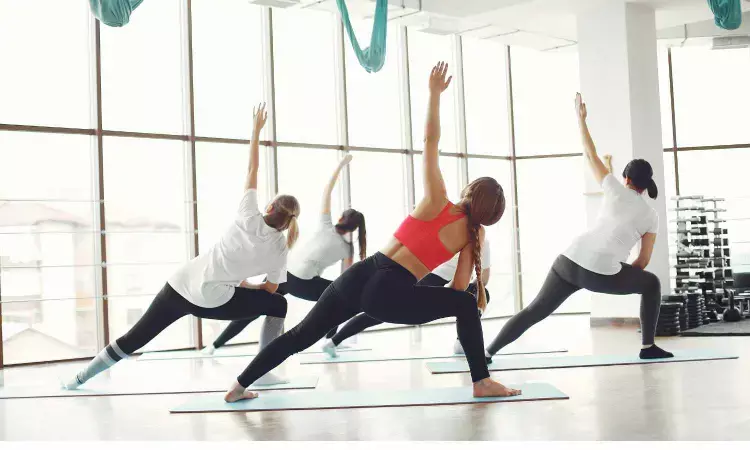- Home
- Medical news & Guidelines
- Anesthesiology
- Cardiology and CTVS
- Critical Care
- Dentistry
- Dermatology
- Diabetes and Endocrinology
- ENT
- Gastroenterology
- Medicine
- Nephrology
- Neurology
- Obstretics-Gynaecology
- Oncology
- Ophthalmology
- Orthopaedics
- Pediatrics-Neonatology
- Psychiatry
- Pulmonology
- Radiology
- Surgery
- Urology
- Laboratory Medicine
- Diet
- Nursing
- Paramedical
- Physiotherapy
- Health news
- Fact Check
- Bone Health Fact Check
- Brain Health Fact Check
- Cancer Related Fact Check
- Child Care Fact Check
- Dental and oral health fact check
- Diabetes and metabolic health fact check
- Diet and Nutrition Fact Check
- Eye and ENT Care Fact Check
- Fitness fact check
- Gut health fact check
- Heart health fact check
- Kidney health fact check
- Medical education fact check
- Men's health fact check
- Respiratory fact check
- Skin and hair care fact check
- Vaccine and Immunization fact check
- Women's health fact check
- AYUSH
- State News
- Andaman and Nicobar Islands
- Andhra Pradesh
- Arunachal Pradesh
- Assam
- Bihar
- Chandigarh
- Chattisgarh
- Dadra and Nagar Haveli
- Daman and Diu
- Delhi
- Goa
- Gujarat
- Haryana
- Himachal Pradesh
- Jammu & Kashmir
- Jharkhand
- Karnataka
- Kerala
- Ladakh
- Lakshadweep
- Madhya Pradesh
- Maharashtra
- Manipur
- Meghalaya
- Mizoram
- Nagaland
- Odisha
- Puducherry
- Punjab
- Rajasthan
- Sikkim
- Tamil Nadu
- Telangana
- Tripura
- Uttar Pradesh
- Uttrakhand
- West Bengal
- Medical Education
- Industry
Too much exercise speeds up the aging process?

Exercises or work out has become a part of todays young population but "everything in moderation"- even when working out! is a saying all must follow. How much to work out or to what extent is a conflicting question and the answer to It is not clear.
According to new research by Scandinavian scientists published in MedRxsays that too much exercise can speed up the aging process.
The study included more than 11,000 same-sex twins over 45 years. Participants self-reported activity and were placed into four categories: sedentary, moderately active, active and highly active. It found aging accelerated for those who exercised too little, and too much.
"So this study was very interesting," said gastroenterologist Dr. Rabia De Latour, who's also an assistant professor at NYU Grossman School of Medicine. "They're trying to really get down to brass tacks and see how much exercise specifically is beneficial for promoting a longer life and better health in terms of mortality rate and also just biological aging, which is what they looked at among twins. But the problem I had with it was when they adjusted for body mass index among people who exercise, it's not the most reliable number to use."
Multiple studies have previously confirmed those who exercise more live longer and healthier lives.
"What I found interesting was that they were saying that people who exercise the least and those who exercise the most are highly active in the study, had the most advanced biological age," Dr. De Latour added. "When they looked at mortality rates, they found that people who were in the sedentary or the least active group of the four groups say delineated had the highest mortality rate. That's totally in line with the data that we already have."
The World Health Organization recommends adults aged 18 to 64 should do at least 150 to 300 minutes of moderate-intensity aerobic physical activity a week, or half the time at a more intense and vigorous level.
"So these numbers are more reasonable, and they're good for keeping your heart healthy, your brain healthy, staving off diseases that we know are associated with an increased mortality rate like obesity, diabetes, heart disease," Dr. De Latour said. "So it's just one good thing you can do for your body to work out. So I would not use this study as an excuse to stop working out."
Reference: Kankaanpää A, Tolvanen A, Joensuu L, Waller K, Heikkinen A, Kaprio J, Ollikainen M, Sillanpää E. The associations of long-term physical activity in adulthood with later biological ageing and all-cause mortality - a prospective twin study. medRxiv [Preprint]. 2023 Jun 5:2023.06.02.23290916. doi: 10.1101/2023.06.02.23290916.
MSc. Neuroscience
Niveditha Subramani a MSc. Neuroscience (Faculty of Medicine) graduate from University of Madras, Chennai. Ambitious in Neuro research having worked in motor diseases and neuron apoptosis is interested in more of new upcoming research and their advancement in field of medicine. She has an engrossed skill towards writing and her roles at Medical dialogue include Sr. Content writer. Her news covers new discoveries and updates in field of medicine. She can be reached at editorial@medicaldialogues.in
Dr Kamal Kant Kohli-MBBS, DTCD- a chest specialist with more than 30 years of practice and a flair for writing clinical articles, Dr Kamal Kant Kohli joined Medical Dialogues as a Chief Editor of Medical News. Besides writing articles, as an editor, he proofreads and verifies all the medical content published on Medical Dialogues including those coming from journals, studies,medical conferences,guidelines etc. Email: drkohli@medicaldialogues.in. Contact no. 011-43720751


